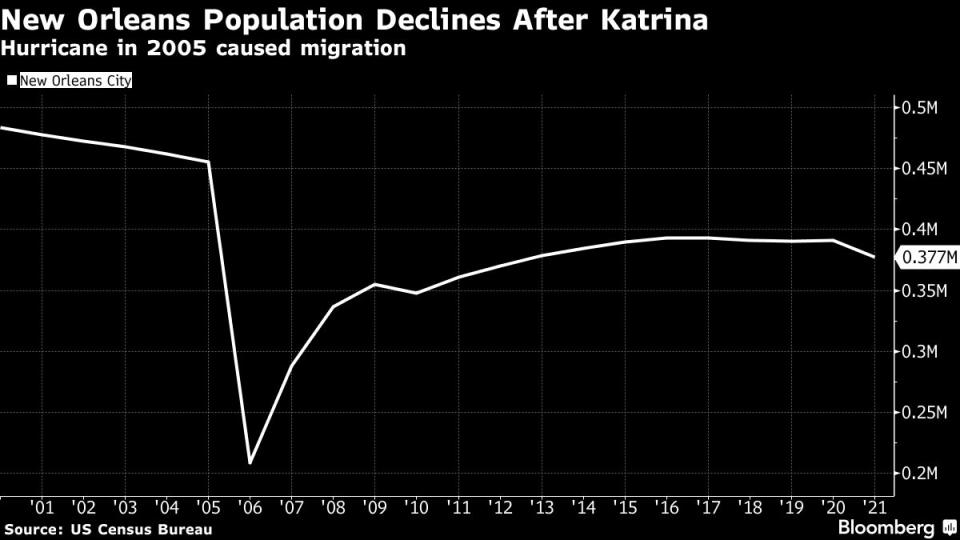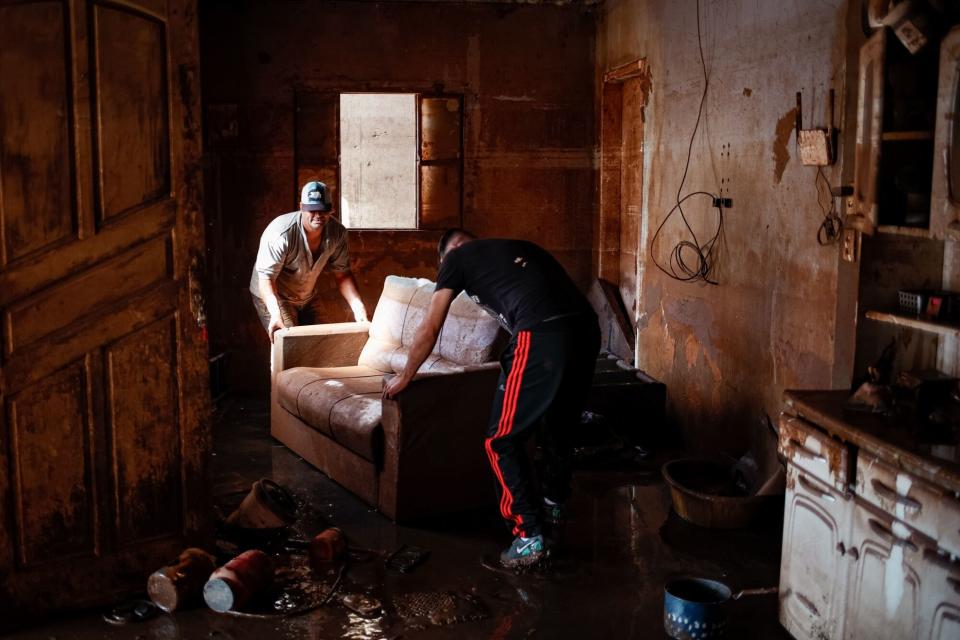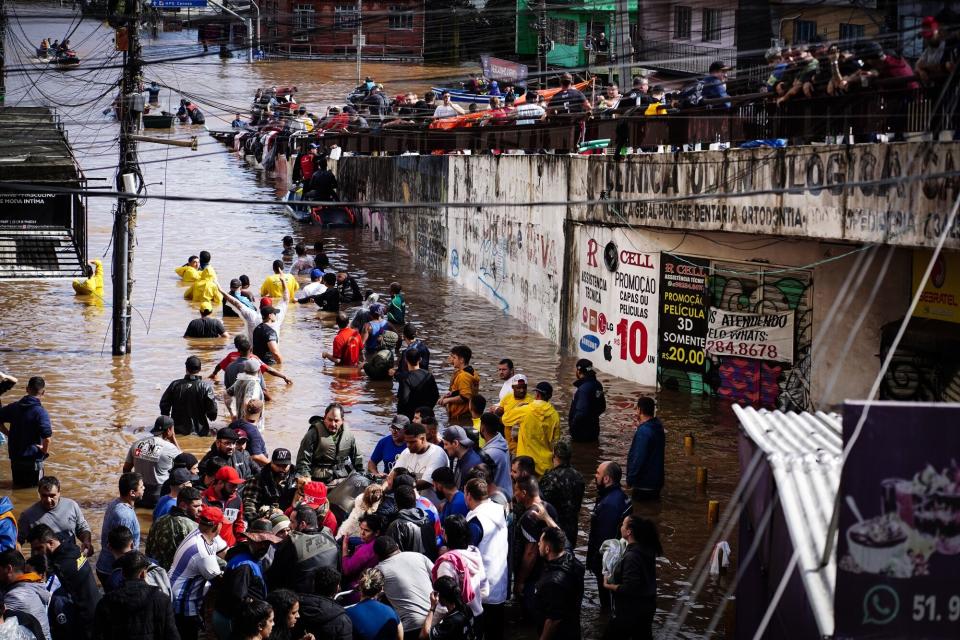Brazil Floods Displace 600,000 in World’s Latest Mass Climate Migration
(Bloomberg) -- On April 29, Jéssica Lima and her family went to bed. They woke up with a river inside their house.
Most Read from Bloomberg
Wall Street Billionaires Are Rushing to Back Trump, Verdict Be Damned
S&P 500 Spikes in Final 20 Minutes of US Trading: Markets Wrap
Donald Trump Becomes First Former US President Guilty of Crimes
Here Are the Latest Verified Results From South Africa’s Election
Lima’s home, in a rural area of Roca Sales, Brazil, is one of the many pummeled by the worst flood in the history of Rio Grande do Sul, the southernmost state in the country.
The catastrophic floods, following torrential rainfall, have taken the lives of at least 169 people and displaced more than 581,000. The impacts have been widespread across the state that is home to 11 million people.
Leia também a versão em português: Enchentes no RS desalojam 600.000 pessoas em migração climática
This was the third major flood for Rio Grande do Sul in the past year, and there are indications that severe weather events such as this will become more common due to climate change.
It’s given many residents like 30-year-old Lima reason to want to leave the area for good. “It’s hard to get a house here,” she said by phone. “It’s hard to find a place that hasn’t been hit by water. And we’ve lost everything. We’ve been pretty shaken up.”
While the federal government has already announced resources in the order of 77.5 billion reais ($14.9 billion) in aid to Rio Grande do Sul – there are new concerns over whether efforts to rebuild its cities will be wasted the next time disaster strikes.
Mayors and other local authorities are now weighing the idea of relocating entire neighborhoods away from high-risk areas. It’s a change that will permanently reshape Brazilian maps and turn thousands of people like Lima into the world’s newest climate refugees.
“When you have the recurrence of dramatic situations like this that killed people, put people at risk, naturally, this is one of the real possibilities that have to be worked on,” Rio Grande do Sul Vice Governor Gabriel Souza said in an interview.
Read More: Latin American Migrants Are Moving From One Risky Place to Another
There are more than 48,000 people sheltered in schools, colleges and sports gymnasiums. A countless number of families are in tents on roadsides, living with continuous rain and temperatures around 7C (44.6F) as winter looms.
The state government is preparing to move displaced residents to four “provisional cities,” located in Canoas, Porto Alegre, São Leopoldo and Guaíba. Meanwhile, 5,500 houses are being built elsewhere at a cost of 140,000 reais ($27,090) each, according to the local government.
Officials say it’s still impossible to estimate how many municipalities will have to move their residents to other areas because it’s still raining and the water has not yet receded completely.
Read More: Brazil Floods Wreak Historic Devastation, With More Rain Coming
Scientists say the intense rains in Rio Grande do Sul resulted from an atmospheric blockage in the central region of Brazil and a mass of polar air that came from Argentina and Uruguay. Another factor was El Niño, the occasional warming of the eastern equatorial Pacific that has global weather consequences.
Climate change also likely contributed. The atmosphere has warmed about 1.3C since pre-industrial times. As air heats up, the amount of water vapor it can contain also increases – roughly 7% more water for each degree. This means more precipitation in many places.
Severe weather has sparked mass exodus from cities before. For example, New Orleans in the US saw its population plummet after Hurricane Katrina in 2005 — with those numbers never returning to what they were in the early 21st century. As climate change increases the number and intensity of floods and fires around the world, more people will likely be forced to move. The question remains: Where to?
Roca Sales has been one of the hardest hit areas by the floods, after water submerged 70% of the city, according to the mayor.
Sinei Ponizio returned to his house there in hopes of saving some of his family’s belongings, only to realize it was a permanent goodbye.
“There is nothing left. The water took everything away,” said the 44-year-old man who could only recover the decapitated statue of Our Lady of Aparecida, the patron saint of Brazil.
Roca Sales’ city hall said 3,000 inhabitants and 13 companies will have to be moved out of riskiest areas, which also suffered from severe flooding last year.
Mayor Amilton Fontana estimates the municipality will spend 15 million reais ($2.9 million) on the acquisition of a new area for homes and businesses.
That’s a small fraction of the 220 million reais ($42 million) lost because of the recent floods.
Fontana said the community already lost hundreds of millions of reais from flooding in September and November.
“There is no longer any way to invest here,” he said. “We have already invested twice, people are impoverished, they no longer have resources or strength. You build and then a flood comes and destroys everything again.”
JBS SA, the world’s largest meat producer, also saw its building in the city flooded. Roca Sales Meat and Meat Products Industry Workers’ Union reported that the plant directly employs between 450 and 500 people in the production of smoked turkey breast, mortadella, hot dogs and sausage. The manufacture of the last two products accounts for 70% of jobs, which could be transferred to two other cities in Rio Grande do Sul, said André Gosmann, the union president and an employee of this JBS unit for 23 years.
JBS SA declined to comment.
Another company affected in the city was the shoe factory where Ponizio’s wife, Cristiane Vicente, works. Calçados Beira Rio SA, located in Roca Sales for 33 years, produces 33,000 pairs of shoes per day. The factory generates 700 direct jobs and more than 1,000 indirect ones.
Its operations were partially resumed last week, but full capacity should only be reached again in 45 days, the president of the company, Roberto Argenta, said in a statement.
“The municipality of Roca Sales presented a new area in the city for the relocation of the branch,” he said. “At the moment, we are carrying out analysis and have not yet reached a decision.”
Read More: Brazilian Floods Are Inflicting Billions in Economic Devastation
In Muçum, also in Rio Grande do Sul, 450 houses and 40 shops and small industries will be rebuilt in new areas acquired by the local administration, said Mateus Trojan, the mayor. The city estimates that 30% of its urban area will be relocated, at an estimated cost of 18 million reais ($3.4 million).
Many families in Rio Grande do Sul still don’t know where to go. Yet, they are aware that there’s no alternative but to start life from scratch.
Back in Roca Sales, Lima’s family has already shown resilience. Her husband and children — a four-year-old daughter and 11-year-old son, who has cerebral atrophy and severe autism — are currently living at a neighbor’s house as they look for a new home.
Before the floods, Lima and her husband had just bought new furniture – not all paid off.
“When we left home, the first thing I did was thank God for being alive,” she said. “The sadness was great, but the important thing is to be well. Things, in time, we’ll get back, God willing.”
How Global Warming Makes Extreme Weather More Likely: QuickTake
--With assistance from Sam Hall.
Most Read from Bloomberg Businessweek
Disney Is Banking On Sequels to Help Get Pixar Back on Track
US Malls Avoid Death Spiral With Help of Japanese Video Arcades
Israel Seeks Underground Secrets by Tracking Cosmic Particles
How Rage, Boredom and WallStreetBets Created a New Generation of Young American Traders
©2024 Bloomberg L.P.

 Yahoo News
Yahoo News 



